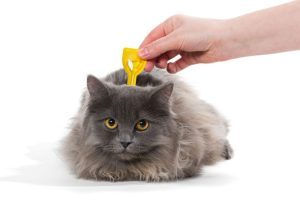How to choose the best flea treatment for your cat or kitten.
As responsible cat owners, ensuring the health and well-being of our feline friends is super important. One common issue that plagues our beloved pets is fleas. These tiny pests can cause significant discomfort, irritation, and even transmit diseases to our fur babies. Therefore, selecting the right flea treatment for cats and kittens is essential.
Understanding different flea treatment options
Below are some of the most common options for flea and worm treatments. What suits your pet will depend on various factors, which I cover after this rundown.
1: Topical Treatments Topical treatments are a popular choice among cat owners due to their convenience and effectiveness. These treatments are applied directly to the skin on the back of the cat’s neck and provide long-lasting protection against fleas. Common topical treatments include spot-on treatments and flea collars. There are a few all in one topical treatments like Broadline and Nexgard that now treat all parasites, including worms. This is a great option for cats who struggle with oral medication.

1: Oral Medications Oral medications are gaining popularity as an effective flea treatment option for cats. These medications come in the form of flavored tablets or chews, making it easier to administer to finicky felines. Oral treatments work systemically, targeting fleas from within and preventing infestations. In New Zealand, these haven’t gained much traction yet, and the efficacy is questionable at best, but for some cats, they work well and can be a convenient way to treat them.
3: Shampoos and Sprays Shampoos and sprays are useful for immediate relief and killing existing fleas on your cat’s coat. While they may not provide long-term protection, they can be used as a supplementary treatment alongside other preventive methods.
4: Flea collars Flea collars are designed to repel and kill fleas and ticks by releasing active ingredients that are gradually distributed over the cat’s coat. These collars typically contain insecticides or natural ingredients that repel fleas, providing continuous protection for several months. When choosing a flea collar, ensure it is specifically designed for cats, as some dog collars may contain ingredients that can be harmful to felines.
Key considerations for choosing the right flea treatments.
- Safety: The safety of your cat should always be your number one priority, when selecting a flea treatment. Look for products specifically formulated for cats and kittens, as some treatments designed for dogs can be toxic to felines. Read product labels carefully, and consult your veterinarian if you have any concerns or questions.
- Effectiveness: Different flea treatments vary in their effectiveness. Consider the severity of the flea infestation, the level of protection required, and the treatment’s duration. Some treatments only kill adult fleas, while others also target eggs and larvae to break the flea life cycle. Choose a treatment that suits your cat’s needs and provides comprehensive protection.
- Age and Weight Restrictions: Pay attention to age and weight restrictions specified on the product packaging. Some flea treatments may not be suitable for young kittens or cats with specific health conditions. Always follow the manufacturer’s guidelines and consult your vet if in doubt.
- Multi-Pest Protection: Certain flea treatments offer additional protection against ticks, mites, and other parasites. If your cat spends time outdoors or in areas where these pests are prevalent, consider a broad-spectrum treatment to safeguard against multiple threats.
When it comes to choosing the best flea treatment for your cat or kitten, prioritizing their safety, effectiveness, and overall well-being is crucial. If you need help deciding what is best for your pet, contact us today. We will be happy to help with general advice, or point you in the direction of one of our treatment plans.
With the right flea treatment, you can protect your feline friend from these pesky parasites and ensure a comfortable and healthy life for them.